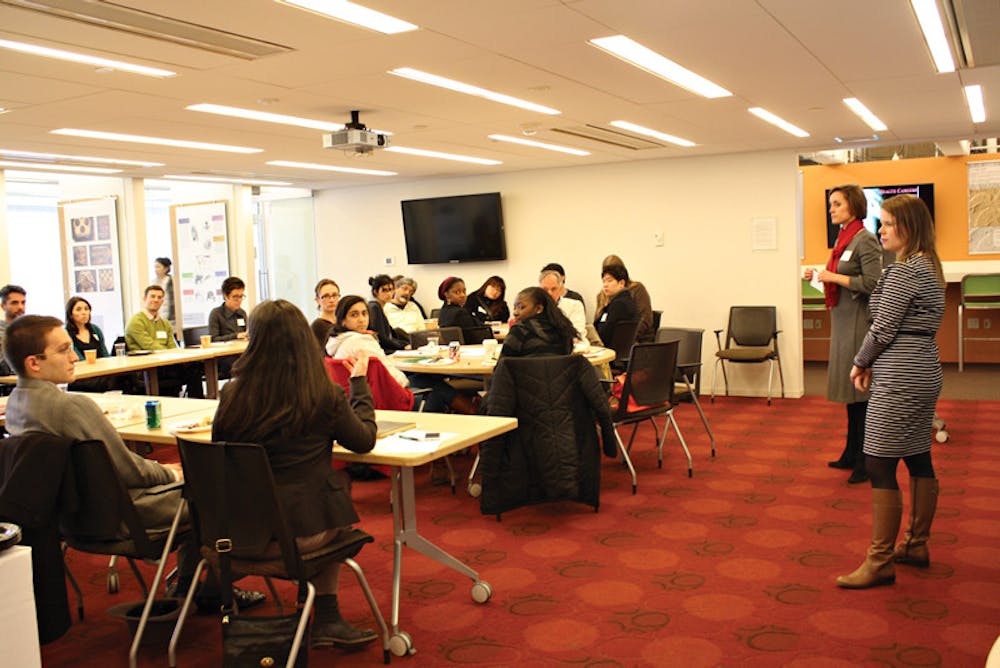“We are here to solve all of your communication woes,” said Annie Sherman Luke, managing editor for Newport Life Magazine, who spoke about how researchers can improve their communication skills Tuesday in the Science Center.
The event kicked off a series of professional development programs called SciComm Exchange. The discussions — which feature speakers talking with audience members over lunch — are a joint effort between the Metcalf Institute for Marine and Environmental Reporting at the University of Rhode Island Graduate School of Oceanography and the Rhode Island National Science Foundation’s Experimental Program to Stimulate Competitive Research. The University's Science Center partnered with the sponsors to host the event.
Scientists should ask themselves what three key features they want people to know about their research, said Meaghan Wims, one of the guest speakers from Duffy and Shanley, Inc. Her company helps scholars and research companies with public relations and communication.
“I think the challenge is when you’re so close to what you’re doing, it’s too hard to whittle it down” to just three main points, Wims said.
When presenting work, researchers should reflect on the background and significance of the work and their own motivations for pursuing the topic, Sherman Luke said.
“Why do you think it is important?” Sherman Luke asked the audience, which included faculty members, students and researchers from other universities. “The ways your eyes light up … will inspire and excite others,” she said.
The workshop aims to help researchers think about the answers to all these critical questions, she said.
During the question-and-answer portion of the discussion, an audience member asked what to do if the real-world applications of research will not be seen for a long time.
Wims said researchers can share their passion for their work and inject personality into their communication style, which can make up for the lack of clarity of a study’s immediate implications.
Another audience member asked whether it is worthwhile for scientists to focus on how a general audience might interpret a piece of research writing.
Journalists try to “translate” scientific research into something the general public can understand, so conveying information in an easy-to-interpret manner is often part of the presentation process, Sherman Luke said.
Wims said researchers should use visualizations to get reporters and the general public alike to understand scientific concepts.
“If you have (visual media), share it,” Sherman Luke added.
Reporters usually want to visit the site where scientists conduct their work, a reality that researchers should be aware of and use to their advantage, Wims said.
“Never sell (the exciting part of work) short,” said Sunshine Menezes, an organizer of the event and executive director of the URI Metcalf Institute. “Scientists are real people, too,” and have interesting stories to tell the public, she said.
After reporters have published their coverage, researchers should call up the reporter if there are issues with what they wrote, Wims said. “Reporters are not your friends.”
The program ended with Menezes describing the interactive programs the Metcalf Institute runs to help scientists communicate their work.
Audience members said they appreciated the insights the guest speakers provided about communicating research effectively.
“It’s quite often I have to interact with the media,” said Nitin Padture, professor of engineering, who attended the discussion. “I want to make sure I am equipped.”
Paul Roselli said he came from Bryant University “looking for general tips” about how to express his scientific work.
Meredith Haas, from the Rhode Island Sea Grant, an oceanography research and outreach partnership with URI, said she came to “hear (the) roadblocks scientists had” while converting their work.
Sherman Luke told The Herald she appreciated the discussion because “any opportunity to get journalists and scientists together is a good opportunity.”
Due to an editing error, a previous version of this story incorrectly stated that the University's Superfund Research Program was a joint partner in the SciComm Exchange series. The University's Science Center partnered to host this exchange, but not the entire series. The Herald regrets the error.

ADVERTISEMENT




